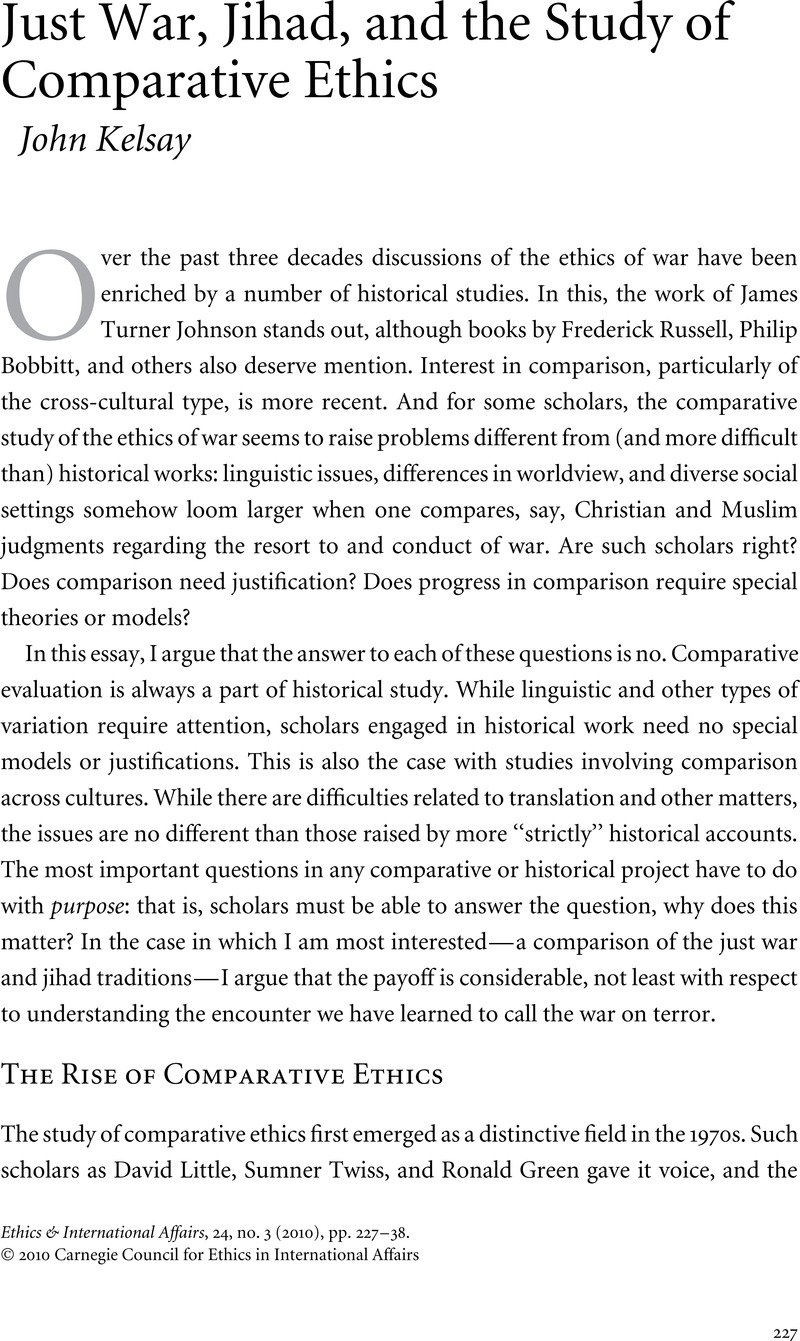Published online by Cambridge University Press: 14 April 2011

1 For example, see Troeltsch, Ernst, The Absoluteness of Christianity and the History of Religions, introduction by James Luther Adams, trans. David Reid (Richmond, Va.: John Knox Press, 1971).Google Scholar
2 See Little, David, “The Present State of the Comparative Study of Religious Ethics,” Journal of Religious Ethics 9, no. 1 (Spring, 1981), pp. 210–27.Google Scholar
3 See Smith, Jonathan Z., Imagining Religion: From Babylon to Jonestown (Chicago: University of Chicago Press, 1982).Google Scholar
4 I have in mind the argument of “On the Very Idea of a Conceptual Scheme,” in Davidson, Donald, Inquiries into Truth and Interpretation (Oxford: Clarendon Press, 1984), pp. 183–98.Google Scholar
5 Johnson, James Turner, Ideology, Reason, and the Limitation of War (Princeton, N.J.: Princeton University Press, 1975)Google Scholar; “The Broken Tradition,” National Interest (Fall 1996), pp. 27–30; “On Keeping Faith,” Journal of Religious Ethics 6, no. 2 (Fall 1978), pp. 98–116; “Aquinas and Luther,” Journal of Religious Ethics 31, no. 1 (March 2003), pp. 3–20; and “The Idea of Defense,” Journal of Religious Ethics 36, no. 4 (December 2008), pp. 543–56.
6 “Learning in War-Time” was a sermon preached in Oxford in autumn 1939. It is printed in Lewis, C. S., The Weight of Glory and Other Addresses (New York: Macmillan, 1949), pp. 43–54Google Scholar; the quote is from pp. 50–51.
7 On these points, see Kelsay, John, Arguing the Just War in Islam (Cambridge, Mass.: Harvard University Press, 2007).Google Scholar The first text referred to is commonly known as the Creed of Sadat's Assassins. The author was Muhammad al-Faraj, and the original title al-Farida al-Ghaibah. It was translated by Johannes J. G. Jansen as The Neglected Duty (New York: Macmillan, 1986). The Declaration originally appeared February 23, 1998, in the London-based Arabic newspaper Al-Quds al-Arabi. Translations abound; the one at ftp.fas.org/irp/world/para/docs/980223-fatwa.htm is generally sound.
8 Kelsay, John, Arguing the Just War in Islam. In what follows, I also draw on a more recent and as yet unpublished paper of mine entitled “Arguing the Just War in Islam: Who's Up? Who's Down?”Google Scholar
9 Here I refer primarily to “COMISAF's Initial Assessment,” also known as “the McChrystal Report,” dated June 26, 2009. This sixty-six-page report, ostensibly confidential to the secretary of defense, was published in the Washington Post on September 20, 2009.
10 Troeltsch, The Absoluteness of Christianity.
11 I owe this reference to Jonathan Z. Smith, and the editorial insertions are his. See his Imagining Religion: From Babylon to Jonestown, p. xii.